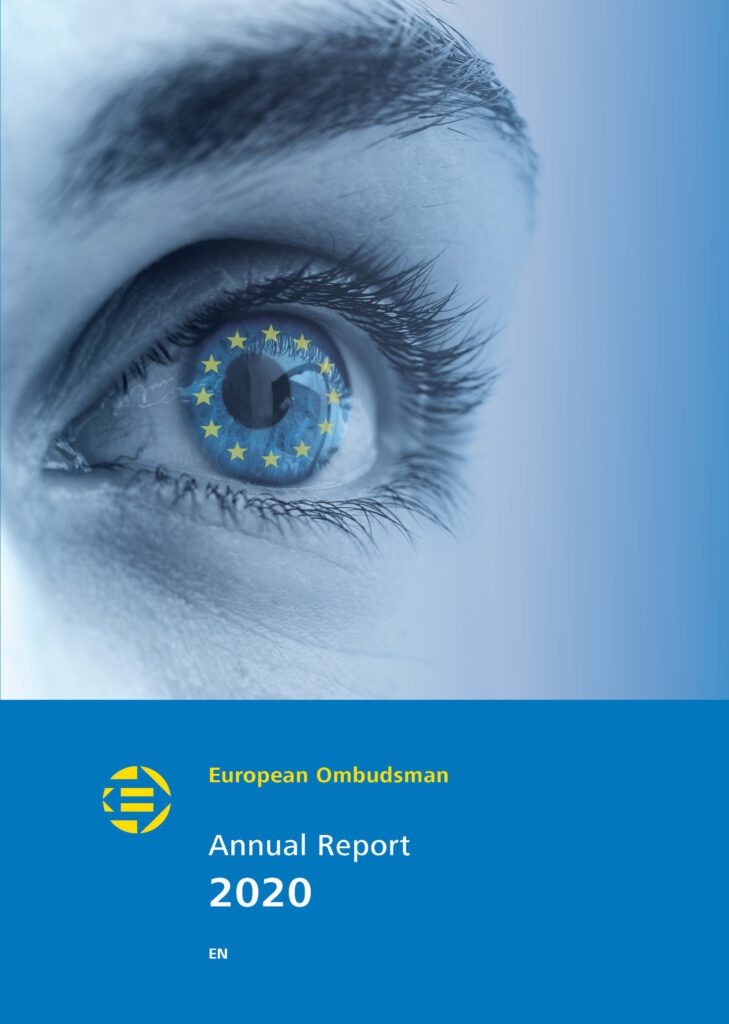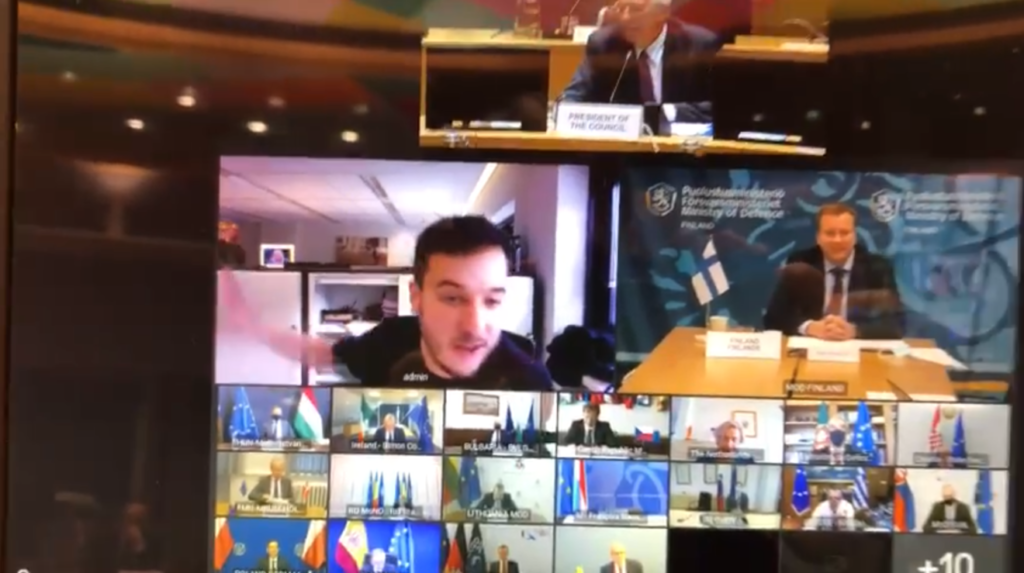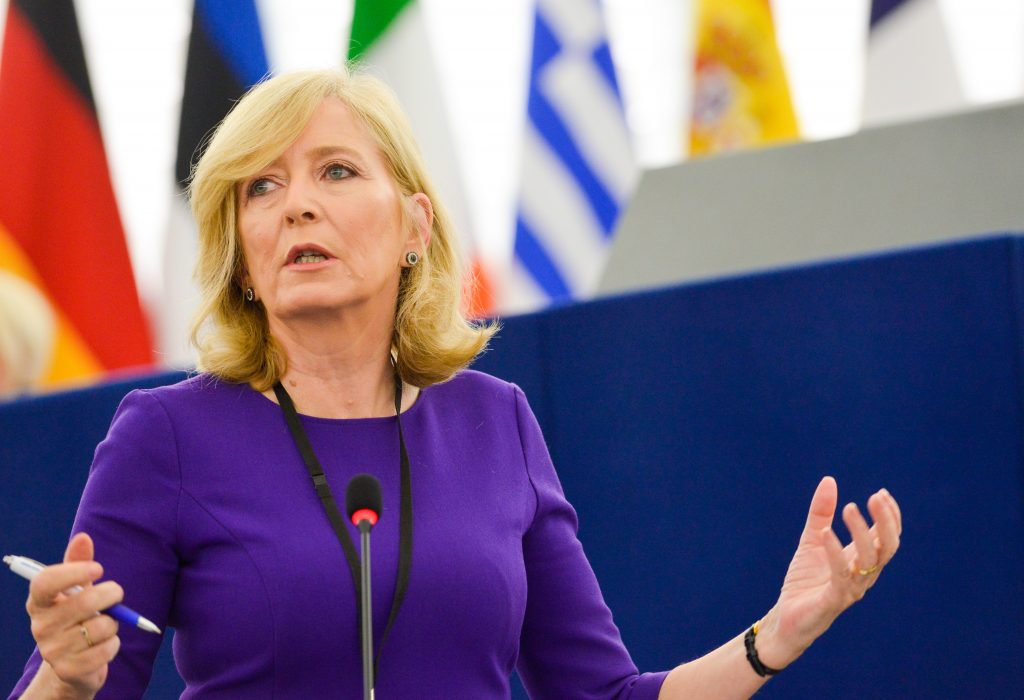European Ombudsman report reaffirms central place of all matters related to transparency in EU watchdog’s work.

On 18 May, the European Ombudsman published her Annual report on activities in 2020. It was a year marked by the Covid pandemic, complaints related to various aspects of transparency, and the 25th anniversary of the European Ombudsman’s office.
Many complainants (as usual), mostly about the Commission (as usual)
As Ombudsman O’Reilly herself points out in the introduction of the report, the work of the EU institutions and agencies, including that of the Ombudsman’s office itself, was critically affected by the ongoing corona virus pandemic. The latter shifted to home officing at an early stage. The Ombudsman notes with satisfaction that as a consequence of this decision, the number of cases handled remained relatively constant compared to 2019.
Indeed, according to the statistics provided in the report, while slightly fewer inquiries were opened (370 in 2020 v 458 in 2019), more people were helped in the course of these inquiries (20,302 v 19,619). The Ombudsman also responded to many requests for information (1,262, compared to 1,373 a year earlier).
Most inquiries in 2020 involved the Commission. More surprising is the fact that the Council, often and eagerly scandalised for its purported intransparency, does not even feature in the top-5 of most investigated EU bodies.
As in other years, the Ombudsman’s inquiries for the largest part involved the Commission (56.8%). This is unsurprising, as the EU’s executive authority is by far the largest EU institution, as well as the most likely EU actor for citizens to come into contact with. More surprising is the fact that the Council, an institution often and eagerly scandalised for its purported intransparency, does not even feature in the top-5 of most investigated EU bodies.
As the report indicates, overall, complaints are handled quickly, with 57% being concluded within 3 months. However, a minority of more complex cases (7%) takes more than a year, though seldom over 1.5 years. This is a marked speeding up compared to 2013, when 27% of inquiries took more than 18 months to be concluded.
Transparency a stable core component
A full 25% of the Ombudsman’s inquiries in 2020 dealt with issues related to transparency and accountability. Most eye-catching were those related to the EU’s handling of the Covid pandemic. Soon after the virus began to spread in Europe, the Ombudsman’s office initiated a host of information-gathering and investigative activities to oversee proper administrative conduct even during the pandemic. The Commission and the European Council were sent letters, while questions were sent to the European Medicines Agency, the European Investment Bank, and the Commission. Finally, investigations were opened into the effect of the pandemic on decision making of the European Centre for Disease Control and the Council of the EU. In addition, the Ombudsman opened several complaint-based inquiries related to the pandemic.

However, the report also recounts investigative activities in other areas related to transparency, distinguishing between environmental policy transparency, accountable decision making, lobby transparency, and access to documents.
In the area of environmental transparency, complaints included the absence of an environmental impact assessment for part of the Mercosur-EU trade agreement, the Council’s annual procedure for setting fishing quotas, and EIB policy with regard to financing of biomass projects.
Related to accountable decision making, the report mainly highlights improvements affected by inquiries in previous years including the Council’s decision to expand the range of legislative documents it proactive discloses, and the Eurogroup’s establishment of a document register.
With regard to lobby transparency, the Ombudsman called out the decision by the departing European Banking Authority executive director to take up a job as CEO of the financing institutions’ European lobby club (AFME), recommending the body to adopt restrictions on future employment to avoid future breaches of public trust. In another inquiry, the Ombudsman made recommendations to the Council regarding the practice of corporate sponsorship of rotating Council Presidencies. This caused an unnumbered group of member states to declare that they would renounce such sponsorships for future Presidencies.
Most eye-catching in 2020 were the inquiries related to the EU’s handling of the Covid pandemic. Soon after the virus began to spread in Europe, the Ombudsman initiated a host of activities to oversee proper administrative conduct even during the pandemic.
Finally, regarding access to documents, the report highlights an inquiry that prompted the Commission to disclose information about expenses made during an official visit of then Commission President Juncker. Another notable inquiry concerned a complaint that the European Council refused to consider text and instant messages as ‘documents’ for the purpose of the EU access to documents law. Other access-related inquiries were opened with the European Defence Agency, Europol, and Frontex as objects of scrutiny.
Silver jubilee
The report also pauses to mark the European Ombudsman office’s 25th anniversary. Initially established in 1995 with the Finn Jakob Söderman being the first to occupy the role, the office has over the years handled over 57,000 complains, according the report, with O’Reilly, in office since 2013, as the third European Ombudsman. Over time, the body established a European Network of Ombudsmen, dealt with various delicate complaints related to inter alia, legislative transparency and lobbying and ethics regulation. A few years ago, the office instituted a fast-track procedure to deal with access to documents complaints in a more expedient manner. This week, the European Parliament, which also appoints the European Ombudsman will vote on a revised Ombudsman’s Statute . With the Council’s consent secured, it will soon thereafter be published and enter into force.
This post was revised on 22 June to reflect the advanced stage of the adoption of the new Statute for the European Ombudsman.


